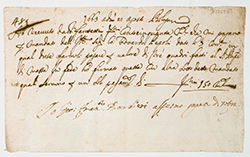Mellon Summer Institute in Italian Paleography
Archival Program Information
For current Research Institute events, please see the Getty Event Calendar.
For current Research Institute events, please see the Getty Event Calendar.
July 14–August 1, 2014
The Getty Research Institute, Los Angeles, California
Directed by Maddalena Signorini, Università degli Studi di Roma "Tor Vergata"
The Getty Research Institute, Los Angeles, California
Directed by Maddalena Signorini, Università degli Studi di Roma "Tor Vergata"

|
|
This three-week intensive residential course offers an introduction to reading and transcription of handwritten Italian vernacular texts from the late medieval though the early modern periods. The course trains students in paleographical skills and offers an overview of materials and techniques. It also situates the history of scripts within the larger historical, literary, intellectual, and social contexts of Italy.
Students examine a wide range of documents including literary, personal, legal, notarial, official, and ecclesiastical works. The course also provides an orientation to the system of Italian archives and allows students to work with inventories, letters, diaries, and other primary source materials from the Getty Research Institute and other collections in the area.
Students examine a wide range of documents including literary, personal, legal, notarial, official, and ecclesiastical works. The course also provides an orientation to the system of Italian archives and allows students to work with inventories, letters, diaries, and other primary source materials from the Getty Research Institute and other collections in the area.
Eligibility
The institute enrolls 15 participants by competitive application. First consideration will be given to advanced graduate students and junior faculty at U.S. colleges and universities. Applications are also accepted from advanced graduate students and junior faculty at Canadian institutions, from professional staff of U.S. and Canadian libraries and museums, and from qualified independent scholars. This graduate-level course is taught entirely in Italian; advanced language skills are required.
Support
Participants will receive a stipend of $900; nonlocal participants may receive reimbursement of up to an additional $2,400 for travel and housing. There are no fees associated with the institute.
Application
This application deadline has passed.
Visit the Newberry Center for Renaissance Studies to learn more about the Mellon Summer Institutes in Vernacular Paleography, and view the list of paleography resources for English, French, Italian, Latin, and Spanish. Funded by a major grant from the Andrew W. Mellon Foundation.
Visit the Newberry Center for Renaissance Studies to learn more about the Mellon Summer Institutes in Vernacular Paleography, and view the list of paleography resources for English, French, Italian, Latin, and Spanish. Funded by a major grant from the Andrew W. Mellon Foundation.